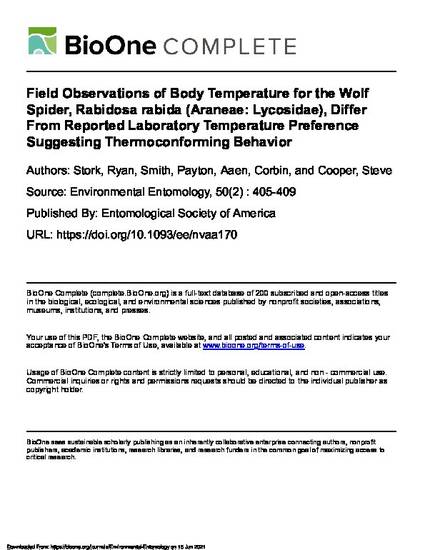
Article
Field Observations of Body Temperature for the Wolf Spider, Rabidosa rabida (Araneae: Lycosidae), Differ from Reported Laboratory Temperature Preference Suggesting Thermoconforming Behavior
Environmental Entomology
(2021)
Abstract
Temperature affects all aspects of ectotherm ecology, behavior, and physiology. Descriptions of thermal ecology are important for understanding ecology in changing thermal environments. Laboratory measurements are an important start to understanding thermal ecology. Lab estimates need to be tested with field observations to confirm that all, important influences are considered. Rabidosa rabida is a large wolf spider with thermal preference and thermal tolerance measures reported in the scientific literature. To test published estimates of thermal ecology from the lab, we took body temperature measurements of mature spiders in the field nocturnally and diurnally using a FLIR camera in July 2019. We made comparisons between sexes and activity periods using field observations. We compared these measurements to the published values for thermal preferences and thermal maximum. We found significant differences between sexes and between diurnal and nocturnally measured body temperatures. Observed field temperatures differed significantly from published preference, both diurnally and nocturnally. Reported thermal preference fell between the diurnal and nocturnal mean measurements closer to the diurnal than nocturnal temperatures. These field observations suggest that more factors than have previously been accounted for are important for understanding the thermal physiology, behavior, and ecology of this spider. Maximum observed diurnal temperatures closely approached the published critical thermal maximum. We observed spiders performing many normal behaviors in conditions well above published thermal preference. This observation suggests that more factors are influencing the behavior and thermal physiology and ecology of this ecologically important spider than have previously been described.
Keywords
- Thermal ecology,
- behavior
Disciplines
Publication Date
Spring January 13, 2021
DOI
10.1093/ee/nvaa170
Citation Information
Ryan Stork, Payton Smith, Corbin Aaen and Steve Cooper. "Field Observations of Body Temperature for the Wolf Spider, Rabidosa rabida (Araneae: Lycosidae), Differ from Reported Laboratory Temperature Preference Suggesting Thermoconforming Behavior" Environmental Entomology Vol. 50 Iss. 2 (2021) p. 405 - 409 Available at: http://works.bepress.com/ryan-stork/9/
